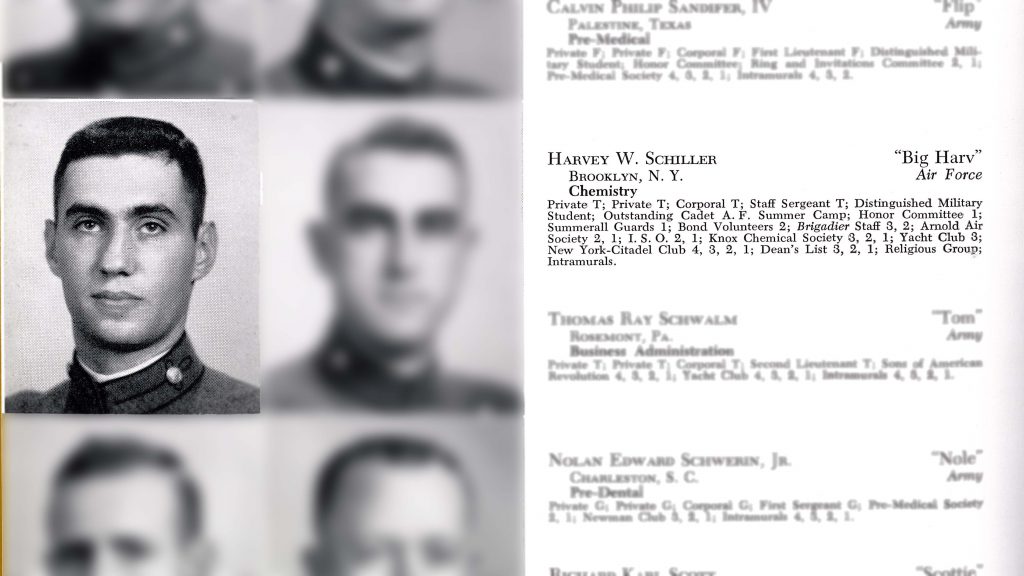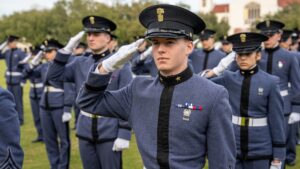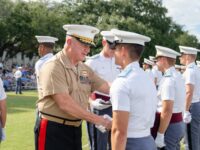
Note: Brig. Gen. Harvey Schiller earned a Bachelor of Science in Chemistry from The Citadel in 1960. He has previously donated the funding needed to renovate chemistry labs on campus; he also delivered a Greater Issues address in 2003.
Press release from the Medical University of South Carolina
CHARLESTON, S.C. – Sports executive and retired U.S. Air Force Brig. Gen. Harvey Schiller and his wife, Marcia, have committed to donating $1 million to establish the Harvey and Marcia Schiller Surgical Innovation Center at the Medical University of South Carolina (MUSCHealth). The center will be dedicated to innovating surgical procedures and developing new surgical tools and technologies to improve patient care.
The center, currently located on the fourth floor of the MUSC Clinical Sciences Building, is a collaborative effort among faculty members in the departments of Surgery, Regenerative Medicine and Bioengineering. Heart surgeon Arman Kilic, M.D., an internationally known expert on artificial intelligence (AI), will direct the center.
“The Harvey and Marcia Schiller Surgical Innovation Center will transform how surgery is performed,” said Kilic. “What we learn and develop at the center will not only change how patients in South Carolina are treated, it will change what’s possible for patients nationwide. Centers across the country will look to us as a leading source of innovation in surgical health care.”
Schiller is a graduate of The Citadel and earned a doctorate in chemistry from the University of Michigan. He has held leadership positions with the Southeastern Conference (SEC), YankeeNets, Turner Sports, Diversified Search, sailing’s America’s Cup and SailGP, and the U.S. Olympic Committee, among others. He was awarded the Distinguished Flying Cross for service in Vietnam.
“Innovation is a core value at MUSC. As someone who has made a career out of pushing the envelope, Harvey Schiller gets it,” said MUSC President David J. Cole, M.D., FACS. “The investment he and Marcia have made in MUSC will allow us to keep pushing the boundaries of science to deliver cutting-edge solutions, with the goal of achieving better, safer, and in some cases, less-costly care for patients. We are tremendously grateful for their generosity and this innovative partnership.”
The Schillers have also generously supported thyroid cancer research at MUSC through their family foundation.
###
About MUSC
Founded in 1824 in Charleston, MUSC is home to the oldest medical school in the South as well as the state’s only integrated academic health sciences center, with a unique charge to serve the state through education, research and patient care. Each year, MUSC educates and trains more than 3,000 students and nearly 800 residents in six colleges: Dental Medicine, Graduate Studies, Health Professions, Medicine, Nursing and Pharmacy. MUSC brought in more than $271 million in biomedical research funds in fiscal year 2020, continuing to lead the state in obtaining National Institutes of Health funding, with more than $129.9 million. For information on academic programs, visit musc.edu.
As the clinical health system of the Medical University of South Carolina, MUSC Health is dedicated to delivering the highest quality and safe patient care while training generations of compassionate, competent health care providers to serve the people of South Carolina and beyond. Close to 25,000 care team members provide care for patients at 14 hospitals with approximately 2,500 beds and 5 additional hospital locations in development, more than 300 telehealth sites and nearly 750 care locations situated in the Lowcountry, Midlands, Pee Dee and Upstate regions of South Carolina. In 2021, for the seventh consecutive year, U.S. News & World Report named MUSC Health the No. 1 hospital in South Carolina. To learn more about clinical patient services, visit muschealth.org.
MUSC and its affiliates have collective annual budgets of $4.4 billion. The more than 25,000 MUSC team members include world-class faculty, physicians, specialty providers and scientists who deliver groundbreaking education, research, technology and patient care.

 Photos from campus: January in review
Photos from campus: January in review Upcoming News from The Citadel – February 2026
Upcoming News from The Citadel – February 2026 Cadets and students named to The Citadel’s fall 2025 dean’s list
Cadets and students named to The Citadel’s fall 2025 dean’s list

